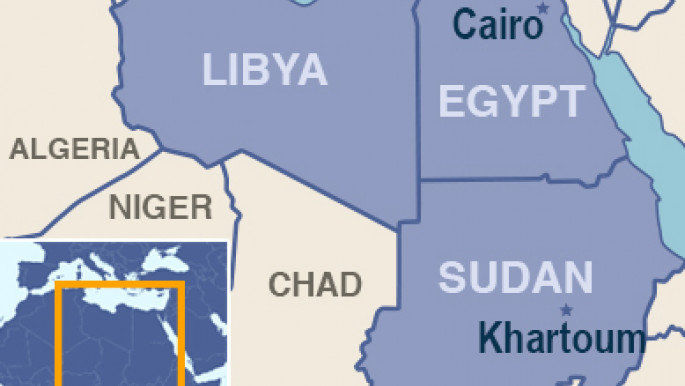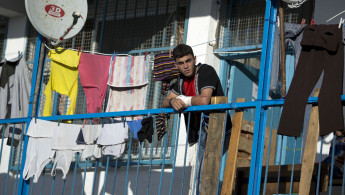In Cairo, a limbo for refugees
Outside the Cairo headquarters of the International Organisation for Migration (IOM), in amongst high-end Zamalek restaurants and barges lazily chugging down the River Nile, there is a group of African refugees who silently protest each week.
They want to know why their resettlement files, transferred from UNHCR to IOM around a year ago, have still not been completed. Most are destined for the United States. When it actually happens, that is.
Al-Fadil and Mohamed, in particular, do not have many options left. The two Darfur refugees, who have travelled the breadth of North Africa since fleeing Sudan in the late 2000s, have been sleeping rough outside IOM for a week when al-Araby al-Jadeed first met them in June.
They were later moved on (with threat of arrest, they claim) and have returned to the instability and uncertainty that many refugees face on a daily basis in Cairo.
"In Darfur, I was working for an organisation…in the sector of childcare and social work," begins al-Fadil. "They had a campaign for distributing food and the government arrested my colleague at the organisation. When I heard that, I fled to Libya and stayed there for two years."
 |
|
Mohamed adds that he left Darfur as a "migrant, looking for work." Darfur was unstable, both in terms of security and jobs.
From Darfur to Cairo
"I went to Libya in 2009 and worked as a security guard from 2009 to 2012. But, after that, the war started," he recalled, remembering the growing racism and suspicion of anti-Qaddafi Libyans who believed African migrants and refugees were working as armed mercenaries for the regime.
"I was arrested on March 23, 2011. After that…when I got out, I found out that some of my colleagues and friends had either died or escaped," Mohamed continued.
"Someone told me that if i went to the Salloum camp [in Egypt], I could get protection there."
Mohamed used Bedouin tribes, and a ring on his finger, to get smuggled back across the border. Al-Fadil would later do the same.
Salloum camp is the first official refugee camp in Egypt since thousands of Palestinians became refugees following the 1948 Nakba (catastrophe). Then, Egypt set up one camp in a former British military barracks in eastern Cairo’s Abbassiya district - known as the “British camp” - before the internees were taken to Sharqiya Governorate and processed there.
Since the two camps were closed, Egypt’s different refugee populations have only ever lived in urban communities around the country.
The camp was news. It was one of the largest humanitarian evacuations in history - with 300,000 people (some 70,000 of them third-country nationals) passing from Libya to Salloum in the first four months of the revolution and ensuing civil war, The Atlantic reported in May of that year. Visiting journalists came back with stories peppered with words like "limbo" and "depression".
| Mohamed used Bedouin tribes, and a ring on his finger, to get smuggled back across the border. Al-Fadil would later do the same. |
The camp was limbo. But for refugees leaving Salloum camp, what was outside the camp was the real unknown. Some would be resettled to Western countries, ready to begin new lives in places where war, at least, was memory rather than daily reality.
A small number were ultimately deported back to their home countries. Others would had to remain - some in prison, others in the world outside.
The Promises of UNHCR
Mohamed and al-Fadil came back to Cairo, where UNHCR has promised to complete their Refugee Status Determination (RSD), which gives them a UNHCR blue card necessary to be eligible for resettlement.
"When we came from Saloum, UNHCR said: "We’re going to complete your procedures in one year…during this time we will support you’," remembers al-Fadil. "But they haven’t completed our procedures and now they’ve stopped the assistance."
Refugees cannot legally work in Egypt, which has meant making ends meet is even harder.
Mohamed got informal work as a cleaner in a multinational firm’s office in Cairo until his "security problem" forced him underground. Al-Fadil also says that without work and much-needed UNHCR assistance, he couldn’t afford to pay the rent for his apartment.
"The landlord took my things too," he says, before ironically gesturing at his cotton shirt and trousers - some of his last remaining possessions in Cairo. He says he’d been sleeping in mosques or on the streets for the past three months before laying his mattress outside IOM’s headquarters.
Since the two men have moved on from IOM, they have returned to the underground. Without resettlement, they are unsure what to do next.
"When they decided to bring us here, they told us that they were going to complete our procedures in one year," says al-Fadil. "We are still here 18 months later."
Irregular migration could be an option and, according to UNHCR data based on composition of nationalities detained on Egypt’s coastal immigration detention estate, more Sudanese than Syrians appear to be making the journey too this year.
"Many people go by the sea," says Mohamed. "But if you want to do that, you have to have money. We don’t have any."
For now, it is a question of waiting, persevering, surviving - the limbo for many refugees in Cairo.
Al-Araby al-Jadeed is withholding the name of this reporter because of the security situation in Egypt.



